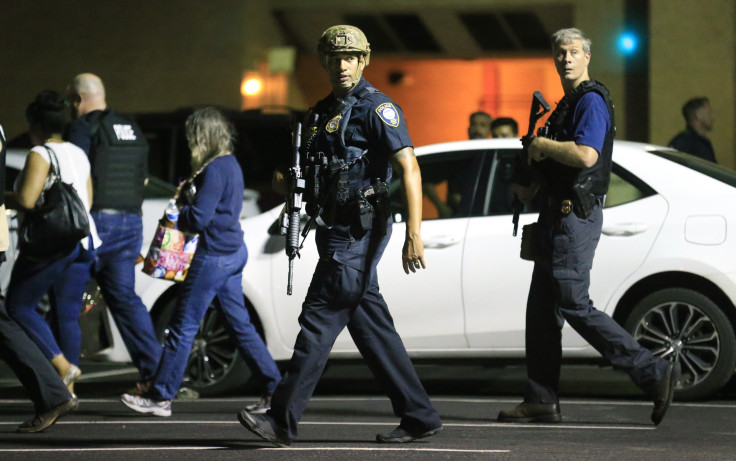Dallas Shooting Was ‘Domestic Terrorism’ But Black Lives Matter Protests Are Not To Blame, Sheriff Says (OPINION)

When I heard about the killing of police officers in Dallas, my first reaction was to pray. My next reaction was sadness — for the officers killed or wounded, for their families and coworkers, and for the country as a whole.
Our reaction as an agency here in the St. Charles Parish Sheriff’s Office was probably the same as all other law enforcement officers everywhere. There is a sense of frustration, anger, abandonment, fear, but a re-dedication of ourselves to continue to do our duty to the best of our ability.
Law enforcement officers understand all too well that we are the thin “line” between order and chaos in a civilized society. Civilization is a thin veneer indeed. We must continue to do our duty to protect everyone from that chaos.
I know some people have said that the Black Lives Matter movement is putting officers at risk. I don't blame the organization. In my view, everyone in this country is guaranteed the right to peacefully protest under the First Amendment. Peaceful protests don't put officers at risk. It is when the message coming from the protests urges or incites violence against a person or group that it crosses the line.
Politicians and national figures who rush to judgment on officer-involved shootings, stating their conclusions before the facts are in, are partly to blame. The media plays a role, too. We are very concerned about the 24-hour news cycle replaying disturbing videos over and over, compounded by social media. The news media should of course report stories such as police-involved shootings, but we urge them to temper the stories with a caveat that it is only a part of the story. The entire facts of an incident will not come out right away. The constant replay of only part of the story can also provoke individuals in our society who may be mentally ill into violence. This is our biggest concern.
I am also very concerned about the effect on children who may be silently traumatized watching the events of the past week unfold.
The bottom line is that we have a system of justice in this country that may not be perfect but is, without a doubt, the best in the world. We must allow it to work. It is not instantaneous. We are a society that wants what we want now. The criminal justice system does not work that way.
“Instant justice” equates to at best vigilantism and at worst terrorism. In my view, the attack on police officers in Dallas who were protecting the right of citizens to peacefully protest was an act of domestic terrorism.
Our message today from the National Sheriffs’ Association is an appeal for calm. It is an appeal to let the justice process move forward.
It’s clear that we need to address the tensions between communities of color and law enforcement officers. The truth of the matter is that law enforcement agencies — both state and federal — have been taking community engagement very seriously. We do it every day. In recent years we have taken an even more active posture toward more community outreach.
Great progress has been made, and part of the tragedy of this week’s events is that perceptions of the events may set that progress back. Law enforcement officers have literally thousands of contacts with citizens every day. Only a tiny fraction ever result in violence to anyone. The 24-hour news cycle and social media leave the false impression that the possible excessive use of force is the rule and not the exception. This is a serious problem.
We are certainly very concerned about our officers’ safety, and naturally more so today. Just two weeks ago in our neighboring Jefferson Parish, a deputy was gunned down while approaching a suspect about whom he had received a 911 call. Everyone needs to understand that no officer sets out on their shift with the intention of using deadly force upon anyone. But their safety is on their minds — as it should be. Situations can escalate and turn deadly literally in a split second.
We believe our written protocols and operating guidelines are constitutional and appropriate. Implementation is the crux of the matter. We cautioned our deputies this morning to be keenly sensitive to the effect that the events of the past week, including the Dallas shooting of officers, may have on our citizens. We have enjoyed very widespread support in this parish and have received a great outpouring of support from citizens today.
The public needs to understand that all law enforcement officers are concerned about their own safety. They want to return home to their families after their tour of duty. I urge anyone who is approached by an officer to simply comply with directions and make no sudden moves. When someone resorts to physical resistance, the chances of injury increase for everyone. Officers around this country have thousands of peaceful, productive contacts with citizens every day. I want to say again: Only a very small fraction ever result in violence of any kind.
My advice to protesters is to demonstrate peacefully — and to make it clear that any violence or hateful rhetoric will not be tolerated.
The current climate adversely affects recruitment for law enforcement agencies nationwide. Unfortunately, many young people today feel that the salary is simply not worth the risk that officers and deputies face in this highly charged atmosphere. Still, it’s good to remember that some citizens actually feel a calling to law enforcement in light of the challenges we face.
Greg Champagne is president of the National Sheriffs’ Association and is the Sheriff of St. Charles Parish, Louisiana.
© Copyright IBTimes 2025. All rights reserved.





















